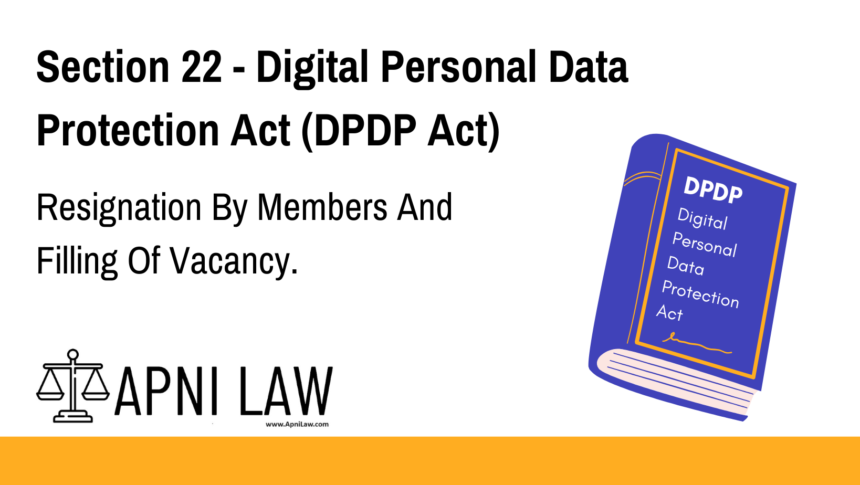Code: Section 22
(1) The Chairperson or any other Member may give notice in writing to the Central
Government of resigning from her office, and such resignation shall be effective from the
date on which the Central Government permits her to relinquish office, or upon expiry of a
period of three months from the date of receipt of such notice, or upon a duly appointed
successor entering upon her office, or upon the expiry of the term of her office, whichever
is earliest.
(2) A vacancy caused by the resignation or removal or death of the Chairperson or
any other Member, or otherwise, shall be filled by fresh appointment in accordance with the
provisions of this Act.
(3) The Chairperson and any other Member shall not, for a period of one year from the
date on which they cease to hold such office, except with the previous approval of the
Central Government, accept any employment, and shall also disclose to the Central
Government any subsequent acceptance of employment with any Data Fiduciary against
whom proceedings were initiated by or before such Chairperson or other Member.
Explanation of Section 22 DPDP
Section 22 of the Digital Personal Data Protection Act, 2023 provides a clear legal framework for the resignation of the Chairperson and Members of the Data Protection Board, how vacancies are to be filled, and restrictions on post-tenure employment.
Key Provisions:
- Written resignation must be submitted to the Central Government.
- The resignation takes effect on:
- Approval from the Central Government, or
- Expiry of three months from the notice, or
- Appointment of a successor, or
- End of the current term — whichever comes first.
- Any vacancy (due to resignation, death, or removal) must be filled as per the procedures of the Act.
- There is a one-year restriction on post-tenure employment, especially with entities (Data Fiduciaries) against whom proceedings were initiated.
- Former Members must inform the Central Government of any such employment even after one year.
This ensures continuity in the functioning of the Board while also protecting against conflicts of interest after Members leave office.
Illustration
Example 1: Resignation of a Member
A Member submits her resignation to the Central Government on January 1. The resignation becomes effective on the earliest of:
- Central Government’s acceptance (say, January 15), or
- After three months (April 1), or
- On the appointment of her successor (say, February 10), or
- End of term (say, May 1).
In this case, her resignation would be effective on February 10 — the day her successor takes charge.
Example 2: Post-Office Employment
A Chairperson who steps down from office cannot take a job with a private company (Data Fiduciary) she previously ruled against unless she obtains prior approval from the Central Government and discloses this employment.
Common Questions and Answers on Section 22 DPDP
1. Can a Member resign at any time?
Yes, by giving a written notice to the Central Government. However, the resignation only becomes effective on the earliest of the specified conditions.
2. What happens if a Member passes away or is removed?
The vacancy must be filled with a new appointment as per the provisions of the DPDP Act.
3. Can a former Member join a private data company immediately after resigning?
No. There is a one-year cooling-off period, and even after that, prior approval from the Central Government is required if the company was involved in proceedings before that Member.
4. Why is post-tenure employment restricted?
To prevent any conflict of interest or undue influence arising from the Member’s prior role in adjudicating cases or handling data protection matters involving the prospective employer.
Conclusion
Section 22 of the Digital Personal Data Protection Act provides for orderly resignation, succession planning, and post-tenure conduct of the Chairperson and Members of the Data Protection Board. These measures ensure smooth transitions, uphold the integrity of the Board, and protect public trust in the regulatory framework of digital data governance.
For more clarity on the DPDP Act and other digital data laws, visit ApniLaw.








